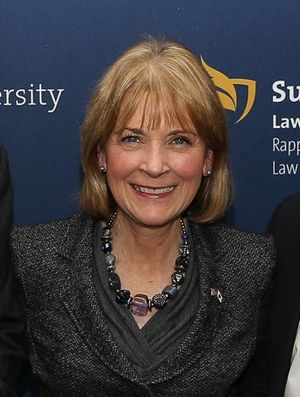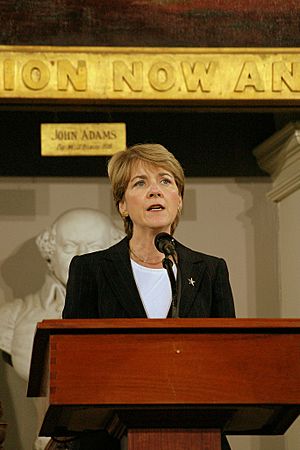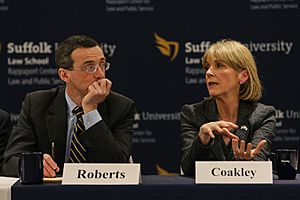Martha Coakley facts for kids
Quick facts for kids
Martha Coakley
|
|
|---|---|
 |
|
| 43rd Attorney General of Massachusetts | |
| In office January 17, 2007 – January 21, 2015 |
|
| Governor | Deval Patrick Charlie Baker |
| Preceded by | Thomas Reilly |
| Succeeded by | Maura Healey |
| District Attorney of Middlesex County | |
| In office January 3, 1999 – January 17, 2007 |
|
| Preceded by | Thomas Reilly |
| Succeeded by | Gerard Leone |
| Personal details | |
| Born |
Martha Mary Coakley
July 14, 1953 Pittsfield, Massachusetts, U.S. |
| Political party | Democratic |
| Spouse | Thomas F. O'Connor Jr. |
| Education | Williams College (BA) Boston University (JD) |
Martha Mary Coakley (born July 14, 1953) is an American lobbyist, lawyer, and former politician who served as Attorney General of Massachusetts from 2007 to 2015. Prior to serving as Attorney General, she was District Attorney of Middlesex County from 1999 to 2007.
Coakley was the Democratic nominee in the 2010 special election to fill the United States Senate seat long held by Ted Kennedy (and held in the interim by Paul G. Kirk). Coakley was defeated 52% to 47% by Republican Scott Brown in what was widely considered an upset. She won reelection as Attorney General in the 2010 general election. Coakley was the Democratic nominee for governor in 2014 but lost to Republican Charlie Baker. Coakley was a lobbyist for the e-cigarette company Juul until June 2022.
Contents
Early life
Coakley was born in Pittsfield, Massachusetts, to Edward J. and Phyllis E. Coakley. Her father was a World War II veteran, Korean War veteran, and small business owner. Her mother was a homemaker. When Coakley was one year old, she and her parents moved to North Adams. There, she attended St. Joseph's School and Drury High School, graduating in June 1971.
Early career
Coakley graduated cum laude with a B.A. from Williams College in 1975 and a J.D. from Boston University School of Law in 1979. In the summer of 1978, while a law student, Coakley clerked for the law firm of Donovan and O'Connor of Adams, Massachusetts. After graduating from law school, Coakley began work as an associate at the law firm of Parker, Coulter, Daley & White and later practiced at Goodwin Procter—both in Boston, Massachusetts.
Assistant District Attorney
She joined the DA's office in 1986 as an Assistant District Attorney in the Lowell, Massachusetts, District Court office. A year later, she was invited by the U.S. Justice Department to join its Boston Organized Crime Strike Force as a Special Attorney. Coakley returned to the District Attorney's office in 1989 and was appointed the Chief of the Child Abuse Prosecution Unit two years later.
In 1997, while serving under Middlesex County, Massachusetts, District Attorney Tom Reilly, she and Gerry Leone led the courtroom prosecution of then 19-year-old English au pair Louise Woodward, who was later convicted in the shaking death of eight-month-old Matthew Eappen of Newton, Massachusetts.
Run for State Representative
In 1997, a special election was held for Boston's 16th Suffolk district to replace James T. Brett, who was resigning. Five candidates, who all lived in the same Ward 16 neighborhood, including a "thoughtful, but unknown assistant DA named Martha Coakley," entered the race. Coakley lost the race to Marty Walsh, receiving 11.7 percent of the vote.
District Attorney
In December 1997, Coakley resigned her position in order to campaign for District Attorney in Middlesex County.
Attorney General
Coakley was elected Massachusetts Attorney General in the 2006 general election as a Democrat, defeating Republican Larry Frisoli with 73 percent of the vote. She was sworn in on January 17, 2007. Coakley became the first woman to serve as Attorney General in Massachusetts.
During the Aqua Teen Hunger Force bomb scare in January 2007, Coakley was widely quoted in the press defending the reaction of Boston's emergency services. Small electronic signs advertising a cartoon had been mistaken for bombs; Massachusetts authorities halted traffic on two bridges and closed the Charles River before realizing the signs were harmless. Coakley defended the precautions because the LED signs had looked suspicious: "It had a very sinister appearance, it had a battery behind it, and wires."
Both of those accused of putting up the signs which caused the bomb scare were given plea bargains, received community service and apologized publicly.
In 2007, she signed a Guide to Consumer Credit and activated a Consumer Complaint and Information Hotline for helping people in financial difficulties.
In September 2008, Coakley worked with Apple Inc. and the National Federation of the Blind to have Apple redesign the popular iTunes software so it would comply with the federal Americans with Disabilities Act, as well as the Massachusetts Equal Rights Act.
In November 2008, Coakley unsuccessfully argued the case of Melendez-Diaz v. Massachusetts before the United States Supreme Court.
On February 5, 2009, she led an 18-state coalition, as well as the Corporation Counsel for the City of New York and the City Solicitor of Baltimore, urging the Environmental Protection Agency to take action in response to the 2007 U.S. Supreme Court ruling in Massachusetts v. EPA. Though the Supreme Court ruled that the EPA did have the authority to regulate greenhouse gases under the Clean Air Act, the Agency had yet to make an official decision on whether it believes that greenhouse gas emissions pose dangers to public health or welfare.
Coakley inherited litigation of the fatal 2006 Big Dig ceiling collapse from outgoing Attorney General Tom Reilly in 2007. On March 26, 2009, she settled the final lawsuit pertaining to the incident. Through eight lawsuits attached to the incident, Coakley's office recovered $610.625 million on behalf of the Commonwealth of Massachusetts.
Coakley declined to conduct a criminal investigation of an aide to Thomas M. Menino, Mayor of Boston, for allegedly violating laws regarding the destruction of public e-mail records, describing the request as politically motivated.
On July 8, 2009, Coakley filed a suit challenging the constitutionality of the Defense of Marriage Act. The suit claims that Congress "overstepped its authority, undermined states' efforts to recognize marriages between same-sex couples, and codified an animus towards gay and lesbian people." Massachusetts is the first state to challenge the legislation.
In 2009, Coakley won settlements of $60 million from Goldman Sachs and $10 million from Fremont Investment & Loan for their abuse of subprime loans and lending.
Political campaigns
1997 Massachusetts state representative campaign
Martha Coakley finished third with 12% of the primary vote in her first run for office against future Boston Mayor and US Secretary of Labor Marty Walsh (33%), neighborhood activist Charles Tevnan (16%) and Edward Regal (10%).
1998 District Attorney campaign
Martha Coakley won the Democratic primary (48%) against Michael A. Sullivan (28%) and Timothy Flaherty (25%) and coasted to a 71–29% general election win against Republican Lee Johnson.
2002 District Attorney campaign
Martha Coakley was unopposed in both the primary and the general election.
2006 Attorney General campaign
Martha Coakley was unopposed in the Democratic primary. She won the General election (73%-27%) against Republican Larry Frisoli.
2010 U.S. Senate campaign
On September 1, 2009, Coakley was the first candidate to take out nomination papers to run in a special election to succeed the late Edward M. Kennedy in the United States Senate in the special election in 2010. Two days later, on September 3, Coakley officially announced her candidacy on her website. She won the Democratic primary on December 8, 2009. Her opponents were Republican Scott Brown and Libertarian Joseph L. Kennedy (no relation to the Kennedy family). Coakley was endorsed by The Boston Globe on January 14, 2010.
Coakley committed a number of gaffes during the campaign.
Coakley admitted to making a mistake while filing the financial disclosure forms for her Senate run, claiming to have no personal assets when she had an account under her husband's name with over $200,000 and a personal IRA containing approximately $12,000.
On January 19, 2010, Coakley was defeated by Brown 52% to 47% in the special election. Brown received 1,168,107 votes, Coakley received 1,058,682 votes, and Joseph L. Kennedy received 22,237 votes.
2010 Attorney General campaign
Coakley successfully ran for reelection, defeating her main challenger, Republican nominee Jim McKenna.
2014 Massachusetts gubernatorial campaign
On September 15, 2013, WCVB-TV learned of Coakley's intention to run for the Massachusetts governorship when incumbent Democrat Deval Patrick retired in 2014. Coakley was set to formally announce her entry into the race the following Monday. She won the Democratic nomination on September 9, 2014. On November 4, 2014, she was narrowly defeated in the general election for governor by Republican Charlie Baker, who was endorsed by the Boston Globe despite the Globe's having endorsed Coakley four years prior in her Senate campaign.
After the election, the Globe wrote that Coakley had been "redeemed, even in defeat," saying that she had been "haunted" by her failed bid for the U.S. Senate four years earlier and had been a "relentless, and frequently terrific, campaigner. Coakley worked her heart out meeting voters across the state. She arrived at the rationale for her candidacy that eluded her four years ago: She had proven she cares about the state's most vulnerable citizens." The Globe added that "this person of remarkable accomplishments, grace, and resilience looks to be leaving public life. That's a big loss."
Post-political career
From 2015 through early 2019, Coakley worked for Foley Hoag, a Boston-based law firm, as a lawyer and lobbyist. While at the firm, Coakley represented the fantasy sports website DraftKings and student-loan firm Navient when state governments were examining the practices of these industries.
In April 2019, it was announced that Coakley had taken a full-time role with electronic cigarette maker Juul on their government affairs team. As a former attorney general, lobbying attorneys general for the vaping industry has called into question the ethics of Coakley's work for Juul, a leader in the electronic cigarette industry accused of marketing nicotine products to youths.
Personal life
Coakley resides in Medford, Massachusetts. She is married to retired police Deputy Superintendent Thomas F. O'Connor Jr.
See also
- List of female state attorneys general in the United States



